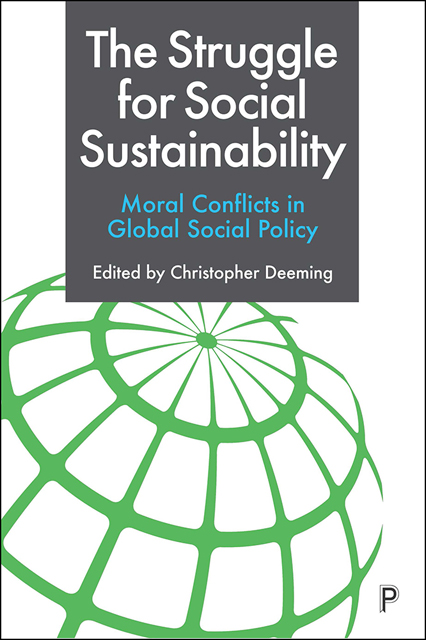Book contents
- Frontmatter
- Contents
- List of boxes, figures and tables
- List of abbreviations
- Notes on contributors
- Acknowledgements
- Preface
- 1 The ‘social’ in the age of sustainability
- 2 ‘No such thing as society’? Neoliberalism and the social
- 3 The social question: reconciling social and economic imperatives in policy
- 4 Disputing the economization and the de- politicization of ‘social’ investment in global social policy
- 5 The social dimension of sustainable development at the UN: from Brundtland to the SDGs
- 6 Paradigm lost? Blocking the path to ecosocial welfare and post- productivism
- 7 World population prospects at the UN: our numbers are not our problem?
- 8 Ageing sustainably
- 9 The political challenges to governing global migration and social welfare
- 10 Bringing in ‘the social’: an intersectional analysis of global crises and welfare
- 11 Global social policy and the quasi- concept of social cohesion
- 12 Putting the global in social justice?
- 13 ‘Go- social’? Inclusive growth and global social governance
- 14 For better or worse?
- 15 The struggle for social sustainability
- Index
4 - Disputing the economization and the de- politicization of ‘social’ investment in global social policy
Published online by Cambridge University Press: 14 April 2023
- Frontmatter
- Contents
- List of boxes, figures and tables
- List of abbreviations
- Notes on contributors
- Acknowledgements
- Preface
- 1 The ‘social’ in the age of sustainability
- 2 ‘No such thing as society’? Neoliberalism and the social
- 3 The social question: reconciling social and economic imperatives in policy
- 4 Disputing the economization and the de- politicization of ‘social’ investment in global social policy
- 5 The social dimension of sustainable development at the UN: from Brundtland to the SDGs
- 6 Paradigm lost? Blocking the path to ecosocial welfare and post- productivism
- 7 World population prospects at the UN: our numbers are not our problem?
- 8 Ageing sustainably
- 9 The political challenges to governing global migration and social welfare
- 10 Bringing in ‘the social’: an intersectional analysis of global crises and welfare
- 11 Global social policy and the quasi- concept of social cohesion
- 12 Putting the global in social justice?
- 13 ‘Go- social’? Inclusive growth and global social governance
- 14 For better or worse?
- 15 The struggle for social sustainability
- Index
Summary
Introduction
Since the mid-1990s, a new vocabulary of the ‘social’ has appeared in global social policy discourses, involving concepts such as ‘social cohesion’, ‘social capital’, ‘social inclusion’ (reducing ‘social exclusion’) and ‘social economy’ (Graefe, 2006: 197; see for example Levitas, 1996; Fine, 1999; Jayasuriya, 2006). In particular, one of the most interesting developments in thinking about the ‘social’ in the 21st century is the emergence of the social investment perspective on welfare reform (Esping-Andersen, 2002; Jenson, 2010; Morel et al, 2012; Hemerijck, 2013, 2018; Deeming and Smyth, 2015). In global social policy discourses more generally, ‘social investment’ (SI) is now actively promoted by international organizations like the Organization for Economic Co-operation and Development (OECD), the International Monetary Fund (IMF) and the World Bank Group (WBG), as well as regional actors like the European Union (EU) and the European Commission (EC) and UN Regional Commissions like the Economic Commission for Latin America and the Caribbean (ECLAC) (Mahon, 2010; Jenson, 2017; Deeming and Smyth, 2018). SI is fast becoming one of the most important frameworks for thinking about the ‘social’, but this worldwide development remains highly problematic.
The chapter is structured in four main sections. The first two sections summarise the problems with the SI perspective before introducing the capability approach (CA). The third section presents social policy as an essential precondition for an effective democracy. Finally, the fourth section explores the implications of treating welfare reform itself as a political–democratic matter. Throughout the chapter, the aim is to highlight the differences of this conception with the SI perspective on social policy.
The social investment perspective
The SI perspective emphasizes the positive contribution of social policy not only to human wellbeing (for example, through the reduction of poverty and social marginalization) but also to economic progress. Thus, in contrast to theories that see a trade-off between social and economic goals, SI attempts to reconcile them, making social equity go hand in hand with economic efficiency (Taylor-Gooby, 2008; Vandenbroucke et al, 2011: 5; Hemerijck, 2013: 134).
Despite its merits, the SI approach has been criticized for adopting an economic framework, with the risk of replacing debates on social values with the economic rationale (Nolan, 2013).
- Type
- Chapter
- Information
- The Struggle for Social SustainabilityMoral Conflicts in Global Social Policy, pp. 73 - 88Publisher: Bristol University PressPrint publication year: 2021

